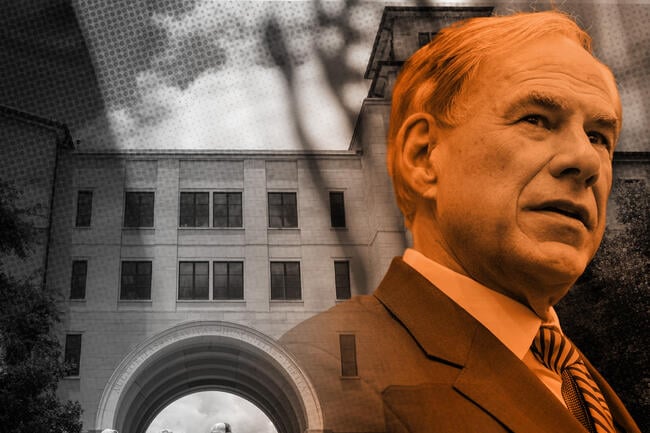You have /5 articles left.
Sign up for a free account or log in.

Texas governor Greg Abbott continues to intervene in public colleges and universities in his state.
Photo illustration by Justin Morrison/Inside Higher Ed | Mikala Compton/Austin American-Statesman via Getty Images | Brandon Bell/Getty Images
Top Republican politicians have fueled the ongoing national repression of higher ed employees and others who have allegedly made offensive statements about last week’s shooting death of conservative activist Charlie Kirk. But Texas governor Greg Abbott has taken the campaign to another level: going after individual students.
Abbott, who has more than 1.4 million followers on X, used that social media website to call for Texas State University to expel a student who appeared to mime Kirk’s shooting at a vigil for Kirk. Shortly after, university president Kelly Damphousse announced that a student in a “disturbing” video “is no longer a student at TXST.”
The university didn’t provide an interview or answer Inside Higher Ed’s written questions Wednesday about whether the student was expelled or disenrolled for another reason or whether Abbott pressured the university in any way beyond his post. The governor appoints Texas university board members, who are then confirmed by the state Senate.
In another post on X, Abbott applauded Texas Tech University for allegedly expelling and arresting a student. Reposting a photo of the student being handcuffed, Abbott posted, “FAFO,” the abbreviation for “fuck around, find out.” A Texas Tech spokesperson didn’t confirm whether the student was expelled or explain why she was arrested, and the campus police department’s incident report says the student was arrested for “simple assault” but doesn’t include any details on what she did.
Abbott’s office didn’t provide an interview or answer multiple written questions but did email a statement from his press secretary, Andrew Mahaleris.
“The Governor and First Lady continue to mourn the horrific assassination of Charlie Kirk and pray for his wife, two young children, and loved ones during this tragic time,” Mahaleris wrote. “We thank every Texan and American who stands together to honor Charlie’s life and legacy. Any student who violates their school’s code of conduct by condoning or inciting political violence must face swift disciplinary action. Advocating for the assassination of political opponents is deplorable and fundamentally contrary to Texan values.”
In the immediate aftermath of Kirk’s death, free speech advocates worried the shooting would further erode free speech rights on campus, and they’ve since raised concern about the apparent expulsions of the Texas students for constitutionally protected speech as well as the campaign to fire faculty who appeared to speak critically about Kirk.
Abbott’s actions are, in one sense, just another example of a conservative joining in the online effort on X to pressure institutions, including universities, to punish those who have allegedly justified or mocked the killing of Kirk last week at Utah Valley University. But the governor’s escalation—a demand for expulsion—is also another example of his and other Texas Republicans’ willingness to be in the vanguard of red states intervening in public higher ed.
In 2023, Abbott signed legislation making Texas one of the first states to institute a sweeping ban on diversity, equity and inclusion in public colleges and universities. In 2024, he called in state troopers to break up a pro-Palestinian encampment at the University of Texas at Austin.
This year, he signed another law restricting free speech on public campuses, including banning all expressive activities from 10 p.m. to 8 a.m. Then, also this year, he signed legislation that allowed public university presidents to take over faculty senates, prohibited faculty elected to those bodies from serving more than two years in a row and created an “ombudsman” higher ed overseer position that can threaten universities’ funding.
Now, even with the Legislature adjourned, Abbott is continuing to intervene via social media.
Haley Gluhanich, a senior program counsel for the campus rights department at the Foundation for Individual Rights and Expression, says that calls by the governor or the public to discipline people at public institutions shouldn’t outweigh universities’ First Amendment obligations.
“They should not reward this type of community outrage,” Gluhanich said. “That curtails free speech; it curtails the First Amendment.”
And—while she noted “there could be more information that I’m not privy to”—Gluhanich said that the Texas State student’s expression in the video Abbott shared was constitutionally protected.
‘In the Neck’
In the purported Texas State video that Abbott shared, the student says, “Charlie Kirk got hit in the neck, bitch.” He slaps his neck and then pretends to convulse, to the laughs of others around him. They appear to be facing a group of students holding signs and an American flag who had gathered at a rally for Kirk. (The university didn’t confirm the video’s authenticity.)
The student then climbs up onto a statue behind a student holding an American flag and says, “Hi, my name is Charlie Kirk,” slaps himself once in the neck and then slumps down, pretending he’s dead.
The X account TheTexasOne posted the video Tuesday morning, and Abbott reposted it a couple of hours later.
“Hey Texas State,” Abbott said in his repost. “This conduct is not accepted at our schools. Expel this student immediately. Mocking assassination must have consequences.”
A few hours later, Damphousse issued the statement saying the university had identified a student “in the disturbing video” and that “the individual is no longer a student.” After that, Abbott posted on X that the “student is now expelled.”
“I will not tolerate behavior that mocks, trivializes, or promotes violence on our campuses,” Damphousse wrote.
In a longer message to the university community, Damphousse wrote that “federal law prevents me or the university from commenting on individual student conduct manners.” He then called for a “measured response.”
“This is a time for calm, for measured response and dialogue, and for keeping ourselves and each other safe,” Damphousse said. “As always, the safety of our campus community is at the heart of every decision that I make. We must not allow this situation to get the best of us. We can disagree on issues, but we cannot allow ourselves to be pulled into a situation where we are adding to the anxiety on our campus. That is not who we are, and that is not who we will become.”
This is the second time in the last week that Texas State has disciplined someone following an online pressure campaign. The other instance involved firing a professor who spoke at a conference about various tactics of different socialist groups. Damphousse accused the professor of inciting violence.
The online response to the departure of the Texas State student highlighted another phenomenon: people on the right disagreeing with one another about whether the crackdown on people mocking Kirk is justified or legal. Jessica Riedl, a senior fellow at the Manhattan Institute—the conservative think tank where anti–diversity, equity and inclusion activist Christopher Rufo works—posted on X that “expelling a student from a public university for mocking Charlie Kirk’s death is blatantly unconstitutional. A big lawsuit is coming, and rightfully so.”
“We can safely confirm that most of the conservative anti-woke warriors were not actually opposed to cancel culture, identity politics, and free speech restrictions,” Riedl added. “They just wanted to be the ones imposing it instead.”
Amy Reid, former gender studies program director at New College of Florida and now the Freedom to Learn interim program director at PEN America, a free expression group, wrote in an email to Inside Higher Ed, “It is difficult to fully understand a situation based only on brief cell-phone videos, and that is precisely the point: free speech is too important, too central an American value, for it to be curtailed in haste.”
Reid urged administrators not to rush to judgment but to instead follow their processes and evenly uphold policies for student conduct violations, if there are any.
“There may be more to the story that we do not know, but the heightened political climate and statements from Texas officials raise serious concerns that the university may be using their policies and procedures as a proxy for punishing speech through supposedly viewpoint-neutral means,” Reid said.
Gluhanich, of FIRE, noted the First Amendment “protects hateful speech. Whether someone finds someone’s speech poorly timed, tasteless, inappropriate, controversial, that doesn’t really matter, especially at a public university.” (Public universities must honor the First Amendment.)
More to the point, Gluhanich said, “The Supreme Court has said that the general endorsement of violence is protected,” pointing to a case in which it deemed unconstitutional a police department’s firing of an employee who said she hoped President Reagan would be killed. For speech to be an unprotected “true threat,” she said, the speaker must essentially communicate a serious expression of an intent to commit unlawful violence.
But the expression in the Texas State video, and others like it across the nation, is not a true threat but “political speech,” Gluhanich said, which “gets the highest degree of First Amendment protection.”



